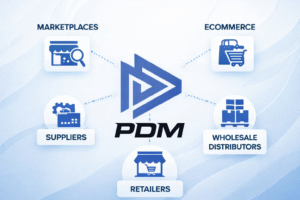Creating world-class automotive products that perform is what aftermarket companies do best.
Even with a commitment to excellence, aftermarket companies that want to sell at leading eCommerce stores like Amazon or brick-and-mortar retail stores like AutoZone face a challenging task.
Whether your company sells suspension components, tires, or exhaust systems, ACES and PIES data is crucial to helping the right part land with the buyers. Unfortunately, managing this data can be incredibly difficult, especially for business owners who wear multiple hats throughout the course of a day. Get it wrong, and buyers may not even see your part as an option on eCommerce platforms, or worse yet, may accidentally purchase the incorrect product, leading to a costly return.
Aftermarket companies must prioritize data management as a top priority. You can make the best product in the world, but if potential customers can’t find it or aren’t compelled to buy it, all your work will be for nothing.
This is why a world-class PIM (product information management) system, like those offered by PDM Automotive, is instrumental in your path to long-term revenue growth and customer satisfaction.
In this post, we explore the reasons why every aftermarket brand should prioritize implementing a customer-centric PIM system.
Reason 1: Centralized Data Management
One of the most frustrating things to deal with as a product manager or company owner is data silos.
A data silo refers to a collection of data held by one department or group within an organization that is not easily or readily accessible by other departments, groups, or systems within the same organization. It’s not hard to imagine what the implications of data silos can be for aftermarket organizations, especially in fast-paced operations where getting products to market is critical to an organization’s success.
Let’s dig into some of the challenges caused by data silos.
Inefficient Data Management: Difficulty accessing and consolidating data across different departments leads to redundant efforts and wasted resources.
Impaired Decision-Making: Lack of a unified view of information results in decisions based on incomplete data, potentially affecting the business’s strategic direction.
Inconsistent Customer Experience: Varied and disjointed data across departments can lead to inconsistent customer service and engagement, affecting customer satisfaction and loyalty.
Slowed Product Time-to-Market: Delays in sharing critical product information across teams can slow the process of introducing new products or updating existing ones in the market.
Increased Operational Costs: Duplicating data storage and processing efforts across silos can lead to unnecessary increases in operational costs.
Difficulty in Forecasting and Planning: Challenges in aggregating sales, inventory, and market trend data from different silos hinder effective forecasting and planning activities.
Compliance and Security Risks: Managing data across disparate systems can complicate adherence to data protection regulations and increase the risk of data breaches.
Barriers to Innovation: Data silos restrict the flow of information, limiting the ability to leverage data for innovation and improvement of products or services.
Decreased Employee Productivity: Employees spend more time navigating through fragmented systems and data sources, reducing productivity.
Poor Inventory Management: Difficulty in obtaining a comprehensive view of inventory levels and demands across different locations or departments, leading to stock imbalances.
PIM systems function as a central point for all of your product data, eliminating data silos and boosting transparency across your entire organization. A PIM system ensures that product data is maintained and distributed from one source, leading to a more efficient operating dynamic.
Reason 2: Enhanced Product Data Quality and Accuracy
Product Information Management (PIM) systems play a crucial role in ensuring the high quality and accuracy of product data through a structured approach to data management.
Here’s how PIM systems maintain data integrity in the automotive aftermarket industry.
Standardized Data Entry: PIM systems provide a standardized format for data entry, ensuring consistency across all product listings. This standardization helps maintain uniformity in product descriptions, specifications, and categorization, minimizing the risk of discrepancies.
Validation Rules: PIM systems implement validation rules that automatically check for errors or missing information during data entry. These rules can verify the accuracy of product dimensions, weights, and other critical specifications, ensuring that all data meets predefined quality standards before publication.
Automated Checks: PIM systems can identify and flag inconsistencies, duplicates, or outdated information through automated checks. This automation helps maintain the integrity of the product database by ensuring that all entries are current and accurate.
Centralized Data Management: By centralizing product information, PIM systems facilitate easier monitoring and updating of data. This centralized approach allows quick corrections and updates across all channels where the product is listed, ensuring consistency.
Reduced Errors and Returns: Accurate product data is especially critical in the automotive aftermarket sector due to the complexity of fitment and compatibility information. Incorrect or incomplete data can lead to customers purchasing the wrong vehicle parts, resulting in high return rates and customer dissatisfaction.
Enhanced Customer Confidence: Detailed and accurate product descriptions, including fitment data, enable customers to make informed purchasing decisions. This clarity reduces the likelihood of mistakes and builds trust in the brand.
Improved Customer Satisfaction: Providing customers with reliable product information ensures they receive the correct parts, leading to higher satisfaction and loyalty. Satisfied customers are also more likely to recommend the brand to others, contributing to positive word-of-mouth.
Operational Efficiency: Accurate data minimizes the need for customer service interventions due to order errors, freeing up resources to focus on other areas of customer support and operational improvements.
Competitive Advantage: Companies that consistently provide high-quality, accurate product information can differentiate themselves in the crowded aftermarket space. This commitment to data accuracy helps attract and retain customers who value reliability.
Reason 3: Efficient Product Data Distribution
Product Information Management (PIM) systems are the backbone for aftermarket brands, streamlining the flow of up-to-date product information across various sales channels, partners, and marketplaces.
A PIM ensures accuracy and readiness for distribution, much like a well-organized warehouse, by acting as a central repository for all product details. The magic lies in its ability to customize and dispatch this information, tailored to the specific needs of each channel. Whether it’s an online marketplace, a retail partner, or a B2B platform, PIM adapts and packages the data precisely, facilitating seamless distribution. This ensures that every touchpoint offers a consistent and reliable product narrative, fostering trust and confidence among consumers and partners.
PDM Automotive elevates this ecosystem with robust APIs, enabling real-time data sharing and updates. This integration creates a high-speed, direct connection between the PIM system and its network, ensuring the latest product information is instantly accessible across all channels. The result is a dynamic, efficient distribution network where aftermarket brands can swiftly update their offerings, and partners always have the freshest information at their fingertips.
This approach allows brands to focus on innovation and growth in a competitive market instead of worrying about how their data is distributed.
Reason 4: Improved Time-to-Market for New Products
In the fast-paced aftermarket industry, the ability to rapidly bring new products to market and update existing listings is invaluable. Rather than focus on data management, teams can redirect their focus to strategic activities that drive growth and innovation. This operational efficiency translates into cost savings and higher productivity, further amplifying your brand’s competitive position.
By centralizing product data management, PIM systems drastically reduce manual data entry, a notorious source of delays and errors. This central repository approach ensures accuracy and consistency across all sales channels and partners and allows for swift, bulk updates to product listings. When a new product is ready to launch, the detailed information can be quickly disseminated across multiple platforms, such as online marketplaces and retailer websites, ensuring a synchronized debut.
By accelerating product introductions and updates, brands with a PIM can respond swiftly to market trends, customer feedback, and competitive pressures. This agility enables them to capture market share, appeal to a broader customer base, and enhance customer satisfaction by providing up-to-date, accurate product information.
Reason 5: Enhanced Customer Experience
Accurate, detailed product information and fitment data, powered by Product Information Management (PIM) systems, enhance the purchasing experience and help reduce unwanted returns.
By providing rich, precise content about products, including specifications, compatibility, and visual aids, PIM systems provide information that allows customers to make informed decisions. Customers can confidently select products that meet their specific needs, leading to a more satisfying and efficient shopping experience. The certainty that comes from having comprehensive product details at their fingertips streamlines the customer journey from research to purchase, fostering a sense of trust and reliability in the brand.
The role of rich product content extends beyond facilitating a seamless purchase process; it plays a pivotal role in building customer loyalty and satisfaction.
When customers are equipped with all the information they need to make an informed choice, they are more likely to feel confident in their decisions, resulting in higher satisfaction. This satisfaction, rooted in a positive, hassle-free shopping experience, encourages repeat business and word-of-mouth recommendations, amplifying the brand’s reputation and customer loyalty.
In an era when enthusiasts are bombarded with choices, the ability of a PIM system to deliver detailed and accurate product information becomes a critical differentiator, ensuring that the right products are in front of the right buyers.
PDM Automotive Makes Product Data Management Easy
Managing product data is complicated, time-consuming, and full of pitfalls that can cause aftermarket brands to lose revenue and hurt their reputation in the automotive community.
PDM Automotive solves the hassle of managing data by providing a world-class PIM (Product Information Management) system that allows aftermarket brands to turn their product data into revenue.
Easily create and manage product data such as fitment information, specifications, descriptions, and much more from a single source of truth that communicates with all leading eCommerce platforms simultaneously. Instead of focusing on the hassle of data management, PDM Automotive lets you focus on creating winning products that win over enthusiasts and automotive professionals, no matter where they shop.
There’s the old way, and then there’s PDM Automotive. Contact us for a demo to see where you can improve your product strategy.

More Resources
Elevate Your Brand in the Automotive Aftermarket With These Content Management Strategies



